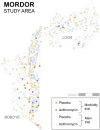Mass drug administration trials of azithromycin: an analysis to inform future research and guidelines
- PMID: 40691807
- PMCID: PMC12278655
- DOI: 10.1186/s40249-025-01322-8
Mass drug administration trials of azithromycin: an analysis to inform future research and guidelines
Abstract
Background: In 2020, the World Health Organization published a guideline on the use of mass drug administration (MDA) of the broad-spectrum antibiotic azithromycin to reduce childhood mortality. As MDA-azithromycin to reduce mortality is considered for expansion to more settings and populations, care must be taken to maximize benefits and reduce risks (e.g., antimicrobial resistance or AMR) of this intervention. Completed and ongoing MDA-azithromycin cluster-randomized clinical trials can provide evidence on the extent to which these benefits and risks accrue and identify practices to monitor these effects and address evidence gaps in future trials.
Methods: We examined azithromycin clinical trials registered on ClinicalTrials.gov and the WHO International Clinical Trials Registry Platform from registry inception to December 31, 2023. We included trials for which azithromycin was administered for the prevention or treatment of a disease or condition that was not explicitly diagnosed or necessary for participant inclusion, and for which treatment was randomized by geographic units. We identified evidence, knowledge gaps, and trends and highlights across five domains: (1) targeting of MDA-azithromycin, (2) clinical endpoints, (3) co- and competing interventions, (4) spillover effects, and (5) AMR monitoring.
Results: Of 1589 screened studies, 30 met all inclusion criteria. These trials were conducted in 13 countries, predominantly (26/30) in sub-Saharan Africa. Nearly a third (9/30) of the trials included mortality endpoints, but few (2/9) included cause-specific mortality endpoints. New evidence suggests the benefits of widening the target age group and the persistence of mortality benefits in settings with competing interventions. Published practices to ensure geographic separation of communities in different treatment arms to reduce spillover effects were not customary. We found information on AMR monitoring practices for just over half the trials (16/30). Of these, half (8/16) included both phenotypic and genotypic AMR testing, and more than half collected specimens to assess the nasopharyngeal and gut microbiomes (9/16) and tested for non-macrolide resistance (11/16).
Conclusions: Further long-term MDA-azithromycin studies to determine which additional countries could benefit, interventions to accompany or replace this intervention, and the extent to which AMR spillover occurs may prove valuable as guidelines are revised.
Keywords: Antimicrobial resistance; Azithromycin; Clinical trial design; Mass drug administration.
© 2025. The Author(s).
Conflict of interest statement
Declarations. Ethics approval and consent to participate: Not applicable. Consent for publication: Not applicable. Competing interests: Anthony D. So is an editorial board member of the journal Infectious Diseases of Poverty. He was not involved in the peer-review or handling of the manuscript. The authors have no other competing interests to disclose.
Figures




Similar articles
-
Antibiotics for trachoma.Cochrane Database Syst Rev. 2011 Mar 16;(3):CD001860. doi: 10.1002/14651858.CD001860.pub3. Cochrane Database Syst Rev. 2011. Update in: Cochrane Database Syst Rev. 2019 Sep 26;9:CD001860. doi: 10.1002/14651858.CD001860.pub4. PMID: 21412875 Updated.
-
Interventions for treating genital Chlamydia trachomatis infection in pregnancy.Cochrane Database Syst Rev. 2017 Sep 22;9(9):CD010485. doi: 10.1002/14651858.CD010485.pub2. Cochrane Database Syst Rev. 2017. PMID: 28937705 Free PMC article.
-
Antibiotic treatment for non-tuberculous mycobacteria lung infection in people with cystic fibrosis.Cochrane Database Syst Rev. 2025 Mar 27;3(3):CD016039. doi: 10.1002/14651858.CD016039. Cochrane Database Syst Rev. 2025. PMID: 40145528
-
Prophylactic antibiotics for adults with chronic obstructive pulmonary disease: a network meta-analysis.Cochrane Database Syst Rev. 2021 Jan 15;1(1):CD013198. doi: 10.1002/14651858.CD013198.pub2. Cochrane Database Syst Rev. 2021. PMID: 33448349 Free PMC article.
-
Interventions for paracetamol (acetaminophen) overdose.Cochrane Database Syst Rev. 2018 Feb 23;2(2):CD003328. doi: 10.1002/14651858.CD003328.pub3. Cochrane Database Syst Rev. 2018. PMID: 29473717 Free PMC article.
References
-
- World Health Organization. WHO Alliance for the global elimination of trachoma: progress report on elimination of trachoma, 2023. Wkly Epidemiol Rec. 2024;2024(99):363–80.
-
- World Health Organization. Yaws 2023. https://www.who.int/news-room/fact-sheets/detail/yaws Accessed 21Feb 2024.
-
- World Health Organization. WHO Antibiotics Portal n.d. https://aware.essentialmeds.org/list Accessed 12 Jan 2024.
-
- World Health Organization. WHO guideline on mass drug administration of azithromycin to children under five years of age to promote child survival. Geneva: World Health Organization; 2020. - PubMed
-
- Porco TC, Gebre T, Ayele B, House J, Keenan J, Zhou Z, et al. Effect of mass distribution of azithromycin for trachoma control on overall mortality in Ethiopian children: a randomized trial. JAMA. 2009;302:962–8. 10.1001/jama.2009.1266. - PubMed
Publication types
MeSH terms
Substances
Grants and funding
LinkOut - more resources
Full Text Sources
Medical
Research Materials
Miscellaneous

